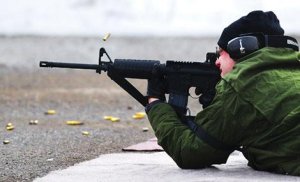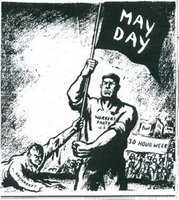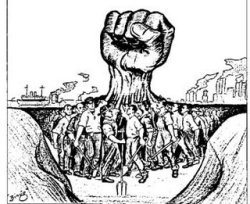Cops are here to protect you. (#5)
Government cops protect you by roughing up a suspect
woman and breaking her arm, then by making up demonstrably false excuses about how she must have been drunk,
and besides which, she might have yelled at them and struggled
when a cop tried to grab her. I mean, she was a preschool teacher and he only had about 150 pounds or so on her; what else could he do?
But, before we go any further, let’s review.
Cops in America are heavily armed and trained to be bullies. They routinely shove their way into situations where they aren’t wanted, aren’t invited, and have no business being; they deliberately escalate confrontations in order to stay in control
through superior belligerence; they commonly use force to end an argument and then blame it on their victim; and they invariably pass off even the most egregious abuses of power as self-defense
or as the necessary means to accomplish a completely unnecessary goal. Cops carry a small armory of weapons and restraints that they can freely use to hurt or immobilize harmless or helpless people, and a small library of incredibly vague laws (disorderly conduct,
resisting a police officer
) that they can use as excuses for hurting, restraining, and arresting their victims, with virtually no danger of ever being called to account for their actions by as long as other cops, who already have a professional interest in minimizing or dismissing complaints about abusive pigs, can figure out some way to fit the use of these incredibly vague offenses
into the police department’s incredibly vague Official Procedures for arrests and for the use of force. And they can always count on their fellow cops to make up, and the mainstream newsmedia to dutifully repeat, absolutely any lie at all, no matter how implausible, and a chorus of city officials and freelance sado-fascist bully boys to get their backs and smear the victim in every media outlet that they can befoul. The practical consequence of the training cops get, and the institutional culture of impunity within which they operate, are squads of arrogant, unaccountable, irresponsible hired thugs with massive senses of entitlement, organized into a paramilitary chain of command, who contemptuously regard their neighbors as mere civilians,
who treat anyone who dares to give them lip or who questions their bellowed commands as a presumptive criminal, who have no scruple against using pain or arrest in order to force you to comply
with their arbitrary orders, and who excuse any sort of abuse by sanctimoniously informing you that it became necessary to stomp on you in order to protect
you — whether or not you ever asked for the protection
in the first place.
Thus, for example, consider the case of Kelly Medora and Officer Christopher Damonte. Officer Christopher Damonte found it appropriate to pull Ms. Medora and her friend aside over jaywalking, to scream at them, grab them, and then, when Ms. Medora asked for his name and said he was acting improperly, called in his posse to surround them, then grabbed her arm and wrenched it behind her back, breaking the bone with an audible crack.
Kelly Medora, a petite preschool teacher who weighed about 118 pounds, went out with a friend in North Beach one Saturday night in 2005 for some fun.
Instead, San Francisco police officer Christopher Damonte, who weighed about 250 pounds, arrested her for jaywalking, twisted her arm behind her back and broke it with an audible crack.
. . .
Damonte grabbed her friend’s arm, held it up by her face and demanded she tell him her age, Medora said. Damonte said he would cite her, but didn’t say why.
Medora saw the name
R. Fitzpatrickon Damonte’s jacket — he had borrowed it from another officer — and asked if that was his name. This seemed to set him off, she said. He said yes and demanded why she wanted to know.I don’t believe you’re treating my friend appropriately,she replied, court records show.You haven’t told us what we’re being cited for. Please let go of her arm.Medora said Damonte started to scream at her. Fearful, she said she turned and walked up to another officer and complained about Damonte.
By her account, Damonte then demanded Medora’s driver’s license. Medora said she’d give him her license if he told her what she did.
Instead, Damonte said
detain her,by this account, and he and two other officers surrounded her. She said she did not resist them, but merely clutched her purse. Then Damonte grabbed her right arm.
It all happened very quick,she testified.Like he physically took my arm and twisted it up back by my neck to a point where I was completely immobilized. And I saidow, ow.And he pulled even harder, and he snapped it.There was an audible
pop,according to a police report.
The violence against women and the hypermasculine domineering control-freak behavior aren’t the only things that this uniformed thug has in common with a walking, talking stereotype of a wife batterer. For example, there’s the self-pitying lies, and the retaliation, and the bizarre victim-blaming excuses.
The city’s lawyer said in court papers that Damonte used an approved method of holding her arm, but she struggled. Then
in an effort to escape,she squatted down andbroke her own arm.
Let me just pause to say that I wish I could say that I never expected to see another excuse from a violent cop that’s as contemptible and ridiculous as She fell
. But honestly, there is no excuse so contemptible and ridiculous that I would be surprised, at this point, to hear it from cops and their defenders. She broke her own arm
included. Maybe next week a cop can explain that his victim wasn’t beaten; she just ran into a door.
Medora cried out in pain. Police called an ambulance and cited her for jaywalking.
At Kaiser Hospital, she was treated for a spiral fracture to her right humerus. Medical records state she was not intoxicated.
Medora said she phoned police from Kaiser to file a misconduct complaint, but no one responded.
Instead, an officer delivered a new citation for resisting, delaying and assaulting an officer. The charges were later dismissed.
So, according to Officer Christopher Damonte, Medora assaulted him. By breaking her own arm.
If you're baffled as to how violent pigs could feel free to indulge in this kind of outrage, and why it keeps happening over, and over, and over again in so many different cities, on so many different police forces, even in these days when brutality like this can no longer be kept in the back of the paddy-wagon, and are easily documented, commonly exposed and widely discussed in newspapers, local TV, on YouTube, on blogs, well, here’s why:
Although Damonte and the city denied wrongdoing, the city recently mailed Medora a check for $235,000, the largest amount ever to settle a lawsuit claiming San Francisco police used excessive force not involving a weapon.
The Office of Citizen Complaints, meanwhile, has found that Damonte used excessive force in the incident and that another officer failed to investigate Medora’s complaint. Damonte faces a disciplinary hearing at the Police Commission and potential punishment including dismissal.
Cops don’t have to give much of a damn about being exposed, because even when they are exposed, cops almost never face any kind of personal consequences whatsoever for their actions, no matter how violent, no matter how widely known, and no matter how obviously helpless, harmless, or innocent their victim. Officer Christopher Damonte, an aggressive, domineering control freak of a man, who flies into violent rages over ridiculous non-crimes and broke a woman’s arms over the slightest questioning of his conduct, will never face any legal consequences for his actions; at the worst, he faces potential
administrative discipline from fellow cops, which amounts to either a paid vacation and a verbal reprimand, or else, if they’re really ready to throw you to the wolves, losing your job. If you or I ran up to a woman, a complete stranger, and got in her face about jaywalking, grabbed her, shoved her around, and then, after she dared to ask for a name and object to her treatment, called in our posse to surround her, and grabbed her and broke her arm, we wouldn’t get fired; we’d be in jail, and we’d also be on the hook to pay her money as damages for her injuries and for her pain and suffering. Officer Christopher Damonte, however, has the Gangsters in Blue and the city government of San Francisco to get his back, so instead of him paying damages, the city government will pay it out for him. And then — dedicated public servants that they are — they will turn right around and send the bill for Officer Christopher Damonte’s brutality to a bunch of innocent San Francisco taxpayers, who will be forced to pay for what he did, even though they had absolutely nothing to do with it.
The State will never police itself; the government will never make a serious effort to protect you from your supposed protectors.
Why should they, when there is nobody to check their abuses and when they can always force you to cover the bill for their own fuck-ups?
Support your local CopWatch.
(Story via Mike Gogulski @ nostate.com 2008-05-11 and Five Before Midnight 2008-05-12.)





